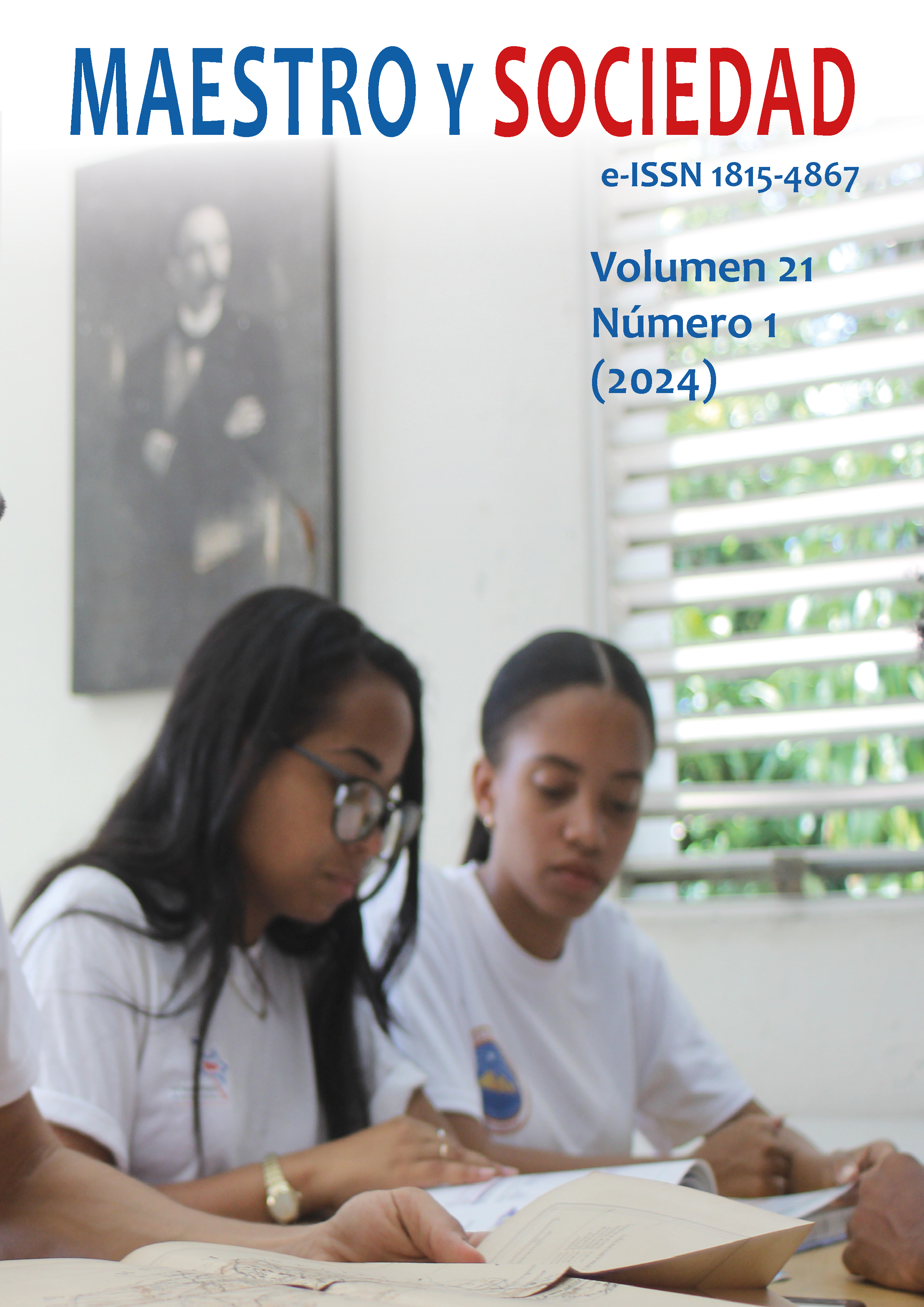Orientación para la convivencia escolar en estudiantes de la Escuela “Braulio Rivera Muñoz”
Palavras-chave:
Habilidades sociales, estudiantes, convivencia escolar, comunicación, programasResumo
Introducción: Los programas de convivencia y su participación en el centro educativo promueven el desarrollo de habilidades fundamentales como empatía, asertividad y comunicación creando ambientes agradables donde los educandos se sienten seguros y valorados. El comportamiento inadecuado de los alumnos en los planteles, representan un reto diario para los profesores, ya que impactan tanto en el proceso de enseñanza-aprendizaje dentro del aula, y en otros ámbitos de la escuela. Esta investigación tuvo como objetivo elaborar un plan de capacitación docente sobre orientación para la convivencia escolar y desarrollo de habilidades sociales en los estudiantes de séptimo año de la Escuela de Educación Básica Braulio Gabriel Rivera Muñoz, del cantón Buena Fe. Materiales y métodos: El diseño se realizó con un enfoque cuali-cuantitativo, con la investigación de exploratoria-descriptiva, técnicas instrumentos que se aplicaron para la recolección de datos; la observación, entrevista y la encuesta que se aplicaron a la población objeto de estudio. Resultados: Los resultados del diagnóstico, permitieron identificar los puntos deficientes para lograr una efectiva convivencia entre los miembros de la comunidad escolar, por lo que se potenció la enseñanza de los docentes mediante un plan de capacitación docente sobre de orientación educativa que sensibilizó los roles académicos, mediante prácticas actualizadas que permitieron fortalecer los vínculos de convivencia. Discusión: Los fundamentos teóricos de un Plan de capacitación docente sobre orientación para la mejora de la convivencia escolar permitieron identificar las diferentes temáticas que se desarrollaron en los talleres planificados, facilitando la selección y preparación de los mismos para el logro de una adecuada convivencia y desarrollo de habilidades sociales. Conclusiones: Por tanto, se concluye que el plan de capacitación docente sobre orientación para la convivencia escolar, sirvió para el desarrollo de habilidades sociales desde una edad temprana, además puede promover a través del docente la capacidad de los escolares para enfrentar diferentes adversidades y permitirles interactuar de una manera saludable con compañeros, padres, docentes y demás agentes educativos.
Referências
Álvarez, G. & Bisquerra, A. (2012). Modelos, áreas, estrategias y recursos. Orientación educativa, 23, 134–139.
Betancourth, S., Zambrano, C., Ceballos, A., Benavides, V. & Villota, N. (2017). Habilidades sociales relacionadas con el proceso de comunicación. Revista Psicoespacios, 11, 133–148. https://dialnet.unirioja.es/descarga/articulo/5922283.pdf
Better, D., Paola, S., Poma, S., & Enrique, L. (2016). Convivencia escolar: una revisión de estudios de la educación básica en Latinoamérica. Revista Virtual Universidad Católica Del Norte, 0(49), 125–145.
Cacho, Z., Balarezo, M. & Ruíz, C. (2019). El desarrollo de habilidades sociales como vía de prevención y reducción de conductas de riesgo en la adolescencia. Revista Transformación, 15(2), 291–305.
Cerezo, F. & Sánchez, C. (2013). Eficacia del programa CIP para la mejora de la convivencia escolar y la prevención del bullying en alumnos de Educación Primaria. Apuntes de Psicología, 31(2), 173–181.
Delgado, A. (2018). Orientación escolar en el marco de la convivencia escolar, una mirada desde las representaciones sociales. Orientación y Sociedad, 2(2), 100–112.
García, L. & Ramón, L. (2014). La Convivencia escolar y la construcción de la ciudadanía. Revista de Pedagogía Bordón, (66), 93-106.
González, B. &Baca, A. (2018). Gestión de la convivencia escolar en educación básica: percepción de los padres. Revista Electrónica de Investigación Educativa, 20(2), 93–102.
Kohlberg, L. (1969). Stage and sequence: the cognitive-developmental approach to socialization. En Goslin, D. A. (Ed.). Handbook of Socialization: Theory and Research. Rand McNally.
Martín, M. (2010). La orientación educativa. Su papel preventivo en la formación y desarrollo de la personalidad de los educandos. EduSol, 10(30), 77–90.
Ministerio de Educación del Ecuador. (2020). Lineamientos para la construcción de la Propuesta Pedagógica. Don Bosco.
Ministerio de Educación. (2013). Aprendiendo a resolver conflictos en las instituciones educativas. MINEDU.
Ramírez, Y. (2017). Clima social familiar y habilidades sociales en estudiantes de educación primaria de Cajamarca. Revista Científica PAIAN, 8(2)., 63–70.
Rogers, C. (1902-1907). Teoría humanista. Academia. Accelerating the world's research.
Publicado
Como Citar
Edição
Seção
Licença
Copyright (c) 2024 Wendy Jacqueline Barcia Orellana, Felipa Elizabeth Solís Portilla, Patricia Cecilia Cedeño Anchundia, Beatriz Elizabeth Mendoza Zambrano

Este trabalho está licenciado sob uma licença Creative Commons Attribution-NonCommercial-NoDerivatives 4.0 International License.
Esta revista proporciona un acceso abierto inmediato a su contenido, basado en el principio de que ofrecer al público un acceso libre a las investigaciones ayuda a un mayor intercambio global de conocimiento. Cada autor es responsable del contenido de cada uno de sus artículos. Los artículos pueden ser inéditos o estar disponibles previamente en servidores de preprints reconocidos por la revista. Sin embargo, no se permite la duplicación de la publicación o traducción de un artículo ya publicado en otra revista o como capítulo de un libro.
This journal provides immediate open access to its content, based on the principle that providing the public with free access to research supports a greater global exchange of knowledge. Each author is responsible for the content of each of their articles. Articles may be previously unpublished or available on preprint servers recognized by the journal. However, duplication of publication or translation of an article already published in another journal or as a book chapter is not permitted.
Esta revista oferece acesso aberto imediato ao seu conteúdo, com base no princípio de que oferecer ao público acesso gratuito à pesquisa contribui para um maior intercâmbio global de conhecimento. Cada autor é responsável pelo conteúdo de cada um de seus artigos. Os artigos poderão ser inéditos ou estar previamente disponíveis em servidores de preprints reconhecidos pela revista. No entanto, não é permitida a duplicação de publicação ou tradução de artigo já publicado em outro periódico ou como capítulo de livro.



























 Universidad de Oriente
Universidad de Oriente 